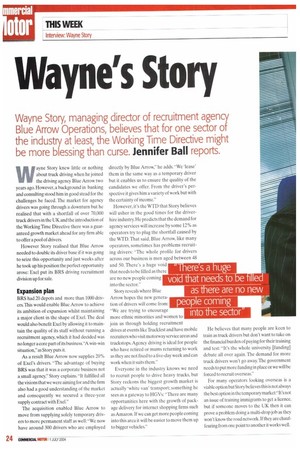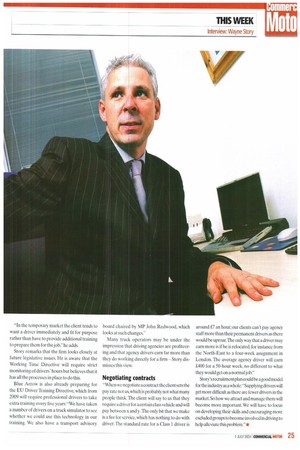Wayne's Story
Page 24

Page 25

If you've noticed an error in this article please click here to report it so we can fix it.
Wayne Story, managing director of recruitment agency Blue Arrow Operations, believes that for one sector of the industry at least, the Working Time Directive might be more blessing than curse. Jennifer Ball reports.
Wayne Story knew little or nothing about truck driving when he joined the driving agency Blue Arrow two years ago. However, a background in banking and consulting stood him in good stead for the challenges he faced. The market for agency drivers was going through a downturn but he realised that with a shortfall of over 70,000 truck drivers in the UK and the introduction of the Working Time Directive there was a guaranteed growth market ahead for any firm able to offer a pool of drivers, However Story realised that Blue Arrow needed to double its driver base if it was going to seize this opportunity and just weeks after he took up his position the perfect opportunity arose: Exel put its BRS driving recruitment division up for sale.
Expansion plan
BRS had 20 depots and more than 1000 drivers, This would enable Blue Arrow to achieve its ambition of expansion whilst maintaining a major client in the shape of Exel. The deal would also benefit Exel by allowing it to maintain the quality of its staff without running a recruitment agency, which it had decided was no longer a core part of its business. "A win-win situation," as Story puts it.
As a result Blue Arrow now supplies 20% of Exel's drivers. "The advantage of buying BRS was that it was a corporate business not a small agency?' Story explains. "It fulfilled all the visions that we were aiming for and the firm also had a good understanding of the market and consequently we secured a three-year supply contract with Exel."
The acquisition enabled Blue Arrow to move from supplying solely temporary drivers to more permanent staff as well: "We now have around 300 drivers who are employed directly by Blue Arrow," he adds. "We 'lease' them in the same way as a temporary driver but it enables us to ensure the quality of the candidates we offer. From the driver's perspective it gives him a variety of work but with the certainty of income.
However, it's the WTD that Story believes will usher in the good times for the driverhire industry. He predicts that the demand for agency services will increase by some 12% as operators try to plug the shortfall caused by the WTD. That said, Blue Arrow, like many operators, sometimes has problems recruiting drivers: -The whole profile for drivers across our business is men aged between 48 and 50. There's a huge void that needs to be filled as there are no new people coming into the sector."
Story reveals where Blue Arrow hopes the new generation of drivers will come from: "We are trying to encourage more ethnic minorities and women to join us through holding recruitment drives at events like Truckfest and have mobile recruiters who visit motorway service areas and truckstops. Agency driving is ideal for people who have retired or mums returning to work as they are not fixed to a live-day week and can work when it suits them."
Everyone in the industry knows we need to recruit people to drive heavy trucks, but Story reckons the biggest growth market is actually 'white van' transport; something he sees as a gateway to HGVs: "There are many opportunities here with the growth of package delivery for interne shopping firms such as Amazon. If we can get more people coming into this area it will be easier to move them up to bigger vehicles." He believes that many people are keen to train as truck drivers but don't want to take on the financial burden of paying for their training and test: "It's the whole university [funding] debate all over again. The demand for more truck drivers won't go away. The government needs to put more funding in place or we will be forced to recruit overseas."
For many operators looking overseas is a viable option but Story believes this is not always the best option in the temporary market:"Ies not an issue of training immigrants to get a licence, but if someone moves to the UK then it can prove a problem doing a multi-drop job as they won't know the road network. If they are chauffeuring from one point to another it works well. "In the temporary market the client tends to want a driver immediately and fit for purpose rather than have to provide additional training to prepare them for the job." he adds.
Story remarks that the firm looks closely at future legislative issues. He is aware that the Working Time Directive will require strict monitoring of drivers' hours but believes that it has all the processes in place to do this.
Blue Arrow is also already preparing for the EU Driver Training Directive, which from 2009 will require professional drivers to take extra training every five years:"We have taken a number of drivers on a truck simulator to see whether we could use this technology in our training. We also have a transport advisory board chaired by MP John Redwood, which looks at such changes."
Many truck operators may be under the impression that driving agencies are profiteering and that agency drivers earn far more than they do working directly for a firm — Story dismisses this view.
Negotiating contracts
"When we negotiate a contract the client sets the pay rate not us, which is probably not what many people think. The client will say to us that they require a driver for a certain class vehicle and will pay between x and y .The only bit that we make is a fee for service, which has nothing to do with driver. The standard rate for a Class 1 driver is around £7 an hour, our clients can't pay agency staff more than their permanent drivers as there would be uproar.The only way that a driver may earn more is if he is relocated, for instance from the North-East to a four-week assignment in London. The average agency driver will earn £400 for a 50-hour week, no different to what they would get on a normal job."
Story's recruitment plan could be a good model for the industry as a whole: -Supplying drivers will get more difficult as there are fewer drivers in the market. So how we attract and manage them will become more important. We will have to focus on developing their skills and encouraging more excluded groups to become involved in driving to help alleviate this problem." •


































































































































































































